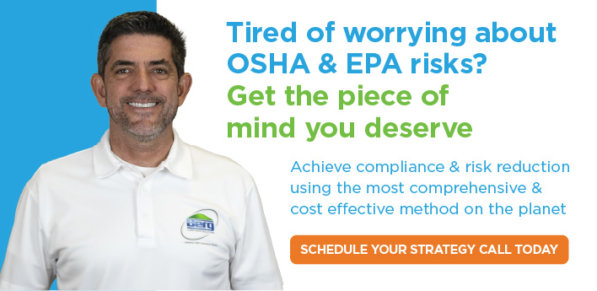Hazardous Waste Fines and Penalties Will Follow If Your Company Fails To Keep Up
Here are the top 10 hazardous waste violations impacting Texas manufacturers which can result in major fines, penalties & disruptions:
- Failure to determine the company’s waste generator status (CESQ, SQG, LQG)
- Failure to create Waste Determinations to identify & characterize all waste streams
- Failure to properly label waste containers
- Failure to train employees on DOT hazardous materials shipping requirements
- Failure to create a Contingency Plan and Emergency Response Procedures
- Failure to conduct weekly inspections
- Failure to develop a Pollution Prevention Plan (aka “P2 Plan”)
- Failure to train employees on EPA & TCEQ waste regulations
- Disposing of hazardous waste into dumpsters
- Dumping hazardous waste down the drain
The US Environmental Protection Agency (EPA) and Texas Commission on Environmental Quality (TCEQ) has a long list of RCRA regulations that Texas companies must follow, but of course this is much easier said than done, especially for small companies who often lack the expertise, time and resources needed to keep up.
Below is a summary description of each of these RCRA violations and links to blog posts which go into more detail on each waste violation:
The #1 Hazardous Waste Violation in Texas: Failure to determine your waste generator status (CESQ, SQG or LQG).
Summary: EPA and TCEQ requires ALL Texas manufacturers who generate industrial and hazardous wast to track the quantity Class 1 and Hazardous waste that they generate each month in order to determine their generator status. Generator status will then determine which additional industrial and hazardous waste regulations apply.
Associated Risks & Liabilities: Failure to determine generator status leaves your company at risk for major fines and penalties if you get inspected and increases the possibility of hazardous wastes being mismanaged at your company.
Learn How to Determine Your Waste Generator Status Here
The #2 Hazardous Waste Violation in Texas: Failure to create & document “Waste Determinations” for all of your industrial wastes.
Summary: TCEQ requires ALL Texas manufacturers, regardless of generator status, to identify and characterize all of their industrial wastes using TCEQ’s “Waste Determination” process. This includes all of your waste streams from hazardous process chemicals, to recycled materials, to the plant trash in your dumpsters.
Associated Risks & Liabilities: Failure to create Waste Determinations leaves your company at risk for major fines and penalties if you get inspected and increases the possibility of hazardous wastes being illegally disposed of at your company.
Learn How To Create Waste Determinations Here
The #3 Hazardous Waste Violation in Texas: Failure to properly label all of your industrial waste containers.
Summary: EPA & DOT requires ALL Texas manufacturers, regardless of generator status, to properly label all of their waste containers. Depending on the type of waste, typical label requirements include the name of the waste, company name, EPA codes, generation start date, etc.
Associated Risks & Liabilities: Failure to properly label all waste containers leaves your company at risk for major fines and penalties if you get inspected and increases the possibility of hazardous wastes being mismanaged at your company.
Learn How To Properly Label Waste Containers Here
The #4 Hazardous Waste Violation in Texas: Failure to train employees on DOT hazardous materials requirements.
Summary: DOT requires ALL Texas manufacturers, regardless of generator status, to properly train applicable employees on hazardous materials shipping requirements in order to sign waste shipping documents (typically a Uniform Hazardous Waste Manifest) that contain hazardous wastes.
Associated Risks & Liabilities: Failure to properly train employees on hazardous materials shipping requirements leaves your company at risk for major fines and penalties if you get inspected and increases the possibility of hazardous wastes being mismanaged at your company.
Learn About DOT Hazardous Materials Training Requirements Here
The #5 Hazardous Waste Violation in Texas: Failure to develop and implement Contingency Plans and Emergency Procedures.
Summary: TCEQ requires SQG & LQG Texas manufacturers to develop and implment these plans. While SQGs only need to have these plans and procedures in place, LQGs must actually develop a “Written Contingency Plan.” These plan and procedure requirements are extensive and must be customized to your actual facility’s requirements.
Associated Risks & Liabilities: Failure to develop these plans and procedures leaves your company at risk for major fines and penalties if you get inspected and increases the risk of significant liabilities if related emergencies occur at your company.
Learn About Contingency & Emergency Procedure Requirements Here
The #6 Hazardous Waste Violation in Texas: Failure to conduct weekly inspections of waste container storage areas.
Summary: TCEQ requires SQG & LQG Texas manufacturers to conduct weekly inspections of their waste storage areas. These weekly inspections should include evaluating waste containers for overall condition, labeling, leaks, corrosion, and more.
Associated Risks & Liabilities: Failure to conduct and document weekly waste area inspections leaves your company at risk for major fines and penalties if you get inspected and increases the risk of storing or shipping non-compliant waste containers.
Learn About Weekly Waste Storage Inspection Requirements Here
The #7 Hazardous Waste Violation in Texas: Failure to develop and implement Source Reduction & Waste Minimization plans (aka: Pollution Prevention or”P2 Plan”).
Summary: TCEQ requires SQG & LQG Texas manufacturers to develop these formal 5 year plans designed to identify and implement waste reduction opportunities, and the plans must be updated every successive 5 years.
Associated Risks & Liabilities: Failure to develop and implement P2 plans leaves your company at risk for major fines and penalties if you get inspected and increases the risk of environmental damage, contamination and pollution in your community and state.
Learn About Pollution Prevention Plan Requirements Here
The #8 Hazardous Waste Violation in Texas: Failure to train employees on EPA & TCEQ waste regulations
Summary: EPA and TCEQ requires SQG & LQG Texas manufacturers to train employees on RCRA industrial and hazardous waste classification & management requirements
Associated Risks & Liabilities: Failure to train your employees on EPA and TCEQ RCRA laws leaves your company at risk for major fines and penalties if you get inspected and increases the risk of environmental damage due to failing to properly manage hazardous waste.
Learn About Hazardous Waste Training Requirements Here
The #9 Hazardous Waste Violation in Texas: Dumping hazardous waste into dumpsters
Summary: EPA and TCEQ requires all hazardous waste generators, regardless of generator status, to identify and properly characterize all hazardous waste streams and dispose of each properly, however many companies fail to do this and end up illegally disposing of these wastes into plant trash dumpsters.
Associated Risks & Liabilities: Illegally dumping hazardous wastes into plant trash dumpsters can result in major EPA and TCEQ fines and penalties, serious environmental damage and accountability for cleanup costs that could run into the $millions.
More Details: Unfortunately it’s not uncommon for employees of companies without a hazardous waste management program, to illegally dum hazardous waste into their “plant trash” dumpsters. Normally it’s not done on purpose, but instead employees simply aren’t aware that it’s illegal. In other words, if the company isn’t carefully managing these issues and properly training its employees, then this can easily happen. This can include paints, chemicals, medical waste and more, all of which can lead to major problems for the company.
The #10 Hazardous Waste Violation in Texas: Dumping hazardous and industrial waste down the drain
Summary: EPA and TCEQ requires all hazardous waste generators, regardless of generator status, to identify and properly characterize all hazardous waste streams and dispose of each properly, however many companies fail to do this and end up illegally dumping wastes down the drain.
Associated Risks & Liabilities: Illegally dumping hazardous wastes into plant trash dumpsters can result in major EPA and TCEQ fines and penalties, serious environmental damage and accountability for cleanup costs that could run into the $millions.
More Details: Unfortunately it’s not uncommon for employees of companies without a hazardous waste management program, to illegally dum hazardous waste down the drain. Normally it’s not done on purpose, but instead employees simply aren’t aware that it’s illegal. In other words, if the company isn’t carefully managing these issues and properly training its employees, then this can easily happen. This can include untreated waste water, chemicals and more, all of which can lead to major problems for the company.
Berg has been helping Texas companies manage hazardous waste for over 18 years and counting. Our company is very unique because we offer turn-key hazardous waste disposal and hazardous waste compliance consulting services.
Call 512-457-0374 Or Click Here
To Schedule Your Free Consultation Today



